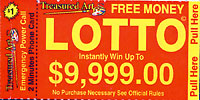Lottery or phone card? State challenges legality
By Barbara Arntsen
Published in News on October 6, 2004 2:02 PM
Are those Lotto tickets advertised on at least one store marquee in Goldsboro legal in the state of North Carolina?
Yes, according to a ruling by Superior Court Judge Robert Hobgood earlier this year. But the state, which wants to see the tickets outlawed, is appealing that decision.
The small red tickets with bold yellow "LOTTO" lettering have a small piece at one end proclaiming that they are a telephone card.

A Lotto ticket/phone card
For $1 you can purchase the "LOTTO" card and get two minutes of phone time. But you also get a chance to win up to $9,999.
Pre-paid phone calls at several other convenience stores in Goldsboro start as low as 2 cents a minute for in-state calls.
But the phone tag on the end of the card makes the difference between an illegal lottery ticket and a legitimate phone marketing pitch.
There are instructions on the back of the card, in very small writing, on how to get a free "game" piece minus the phone card.
It's not exactly clear what the game is, but the instructions say it is open only to legal U.S. residents, 18 years and older.
For further information on game rules, participants can write to an address in South Carolina.
A reporter for the News-Argus bought a ticket. It was not a winner. The message after peeling back the top said: "Good luck. Try Again."
The reporter also attempted to use the two-minute phone card. First you must punch in the required phone number and press the correct number for instructions. Then you must enter a 15-digit PIN number. After this, you can dial the number you wish to call.
The reporter called a Wilmington number and was connected for about seven seconds, before being interrupted by a fast busy signal.
On the second time attempting to connect, a message came on saying there were "insufficient funds" for a call.
Maj. Mike Hopper of the Goldsboro Police Department said there was nothing the Police Department could do to stop the sale of the tickets because the phone card part of the ticket made them legal.
State Alcohol Law Enforcement Agent Robert Ivey said his agency had tried to stop the ticket sales in retail stores with beer and wine licenses, but were halted by a lawsuit two years ago.
Treasured Arts Inc. and American Treasures Inc., the companies marketing the tickets, sued the state of North Carolina; Gov. Michael Easley; the secretary of crime control and public safety, Bryan E. Beatty; and the director of A.L.E., John D. Smith III.
Judge Howard E. Manning Jr. issued a preliminary injunction against the state in 2002, allowing the cards to be sold until the matter was settled in court.
Lawyers for the companies argued that the cards have inherent value, "as reflected in the fact that they permit the purchaser to make long-distance telephone calls."
According to the suit, a substantial number of individuals have gotten game pieces from the companies without paying any money or giving anything of value.
North Carolina case law defines a lottery as "any scheme for the distribution of prizes, by lot or chance, by which one, on paying money or giving something of value to another, obtains a token which entitles him to receive a larger or smaller value, or nothing, as some formula of chance may determine."
Hobgood said that the telephone cards and their accompanying promotional game pieces are not prohibited gambling, gaming or lottery products or devices.
Instead, in his ruling, he said that they were "telephone calling cards with substantial value and utility, the sales of which are promoted by premium awards."
Hobgood then issued a permanent injunction against the state, stopping law enforcement officers from discontinuing the sale of the cards.
"It's out of our hands," Ivey said. "Right now they say it satisfies the statute."
The state has appealed Hobgood's ruling, and the issue is scheduled to be decided by the North Carolina Court of Appeals.
